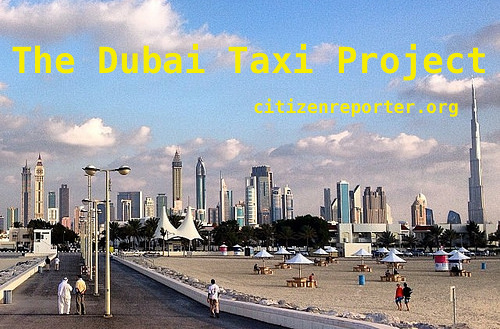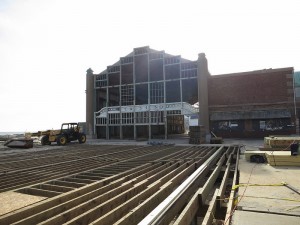Somewhere along the neverending Jumeirah Beach Road in Dubai, within view of world famous sky scrapers and people enjoying themselves on the beach, you’ll find a little oasis of healthy food and unique style. The place is Comptoir 102, a concept cafe created and run by my guests on today’s podcast: Alexandra de Montaudouin and Emma Sawko. While their place may not be far from downtown, this little cafe is in a very different world from the brand name corporate culture that took root in Dubai more than a decade ago.
Tag Archives: culture
Ali Al Saloom: Connecting the World with Emirati Culture
Ali Al Saloom, better known on the internet as Ask Ali, came on the scene in the same way many of us podcasters, bloggers, and other independent content creators did over the past 10 years; with an idea and a dream. His goal, to teach the world about his people and his culture, to dispel myths and contribute factual information about the UAE. The result: thousands of published answers to all kinds of questions about the UAE, a successful cultural consultancy service, and an internationally recognized representative of a country and a culture that until recently were little known or poorly understood
A pioneer in both new media and internet outreach, Ali can run down the list of reasons people around the world are coming to this region and he is proud of what his nation has accomplished. At the same time he sees the risks and responsibilities that come with success and wealth, as he talks about the things that concern him in the near future.
While much of my journey has been about taxi drivers and the wisdom they can share about this place and life as a whole, a conversation with Ali Al Saloom provides a rare chance to hear from a citizen of this nation and to learn from his unique experience.
Frank Edward Nora: The Audio Curator
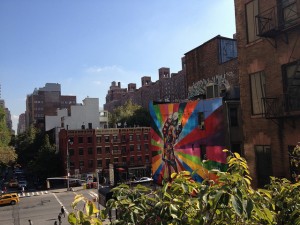 Frank Edward Nora believes, as that now cliché Chinese proverb says, we actually do live in very interesting times. Part of his love and dedication to creating original audio content and preserving bits of audio from the past is because of his interest in what will be available for future generations. For over ten years he has produced the Overnightscape, a personal audio journey, a chronical of one man’s daily life and thoughts in the New York City Tri-State area.
Frank Edward Nora believes, as that now cliché Chinese proverb says, we actually do live in very interesting times. Part of his love and dedication to creating original audio content and preserving bits of audio from the past is because of his interest in what will be available for future generations. For over ten years he has produced the Overnightscape, a personal audio journey, a chronical of one man’s daily life and thoughts in the New York City Tri-State area.
 On today’s podcast, a long overdue meeting, as I sit down with Frank in Manhattan, and discuss his role in the big picture of internet, media production, and history.
On today’s podcast, a long overdue meeting, as I sit down with Frank in Manhattan, and discuss his role in the big picture of internet, media production, and history.
Visit and Listen to his program, The Overnightscape. You can also follow him on twitter and the other usual places.
Why I Talk to Jehovah’s Witnesses
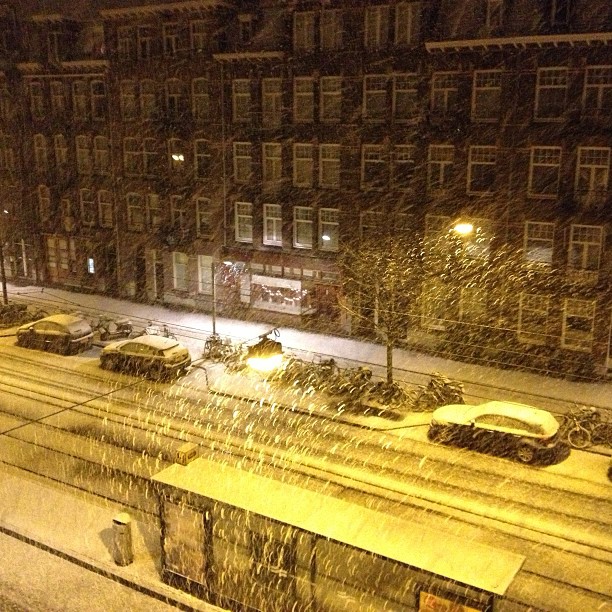 Years ago, when I finally put my last name on the front door bell of my home in Amsterdam, I began getting visits from Jehovah’s witnesses. Not just any run-of-the-mill witness, but Portuguese and Brazilians who noticed my last name and figured – here’s a guy we can talk to!
Years ago, when I finally put my last name on the front door bell of my home in Amsterdam, I began getting visits from Jehovah’s witnesses. Not just any run-of-the-mill witness, but Portuguese and Brazilians who noticed my last name and figured – here’s a guy we can talk to!
Sure enough, each time they rang, I would come out to greet them. Usually it was the kindest elderly Portuguese couple that reminded me of all my favorite relatives. Other times I would chat with two middle aged Brazilian ladies who were always smiling and pleasant. In either case a long tradition began, the word was out: some Portuguese guy lives in that house and he’ll talk to you, he’ll even invite you in for tea sometimes.
Why would I, a person who has no religion and no desire for one, spend so much time chatting with people who are constantly asking me if I believe in all these religious names and writings? My simple answer is- I live far from the Portuguese environment I grew up in back in New Jersey, I miss the daily contact and the language that brings me right back to my childhood and my family somehow. I’ll watch a copies of the newsletter pile up in my recycling bin; I’ll never turn one down. I’ll even dodge the question of whether or not I read the last one, so as not to hurt their feelings.
There is another reason I speak with Jehovah’s witnesses- the journalist in me is fascinated by people and their life missions. I obviously have mine, right here on this website. And I know how hard it can be, to carry on, to be heard, and to keep your faith (in my case, faith in my own abilities). I imagine my gentle Portuguese couple, walking the cold streets of Amsterdam, and getting doors slammed in their face. It makes me sad and want to boost their spirits, by preparing the tea and asking questions about their home towns and their families. Sure, they can ask me a few questions about god in exchange, it is a fair trade I suppose.
People probably think Jehovah’s Witnesses are weird. Part of me does. But if I think longer about it, about all the beauty in a warm greeting and friendly conversation over tea, I’m reminded of all the other missions people have in this world that are deemed understandable. People dedicated to making money. People dedicated to their partners or children. People dedicated to their art. These things are not all the same, but I see a certain similarity between everyone and their personal missions. Even those who’s mission is religions, one of my least favorite topics.
Not surprisingly, while I was visiting New Jersey in late 2012, I answered the door at my parents’ house. There, standing before me, were two Brazilian Jehovah’s Witnesses asking for my father by name like he was an old friend. “Is your father home? We normally chat with him and he always accepts our literature.”
This Jersey Shore
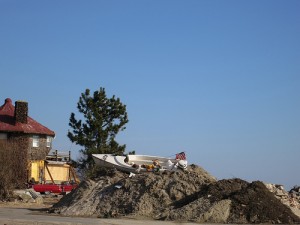 In the final and perhaps odd chapter of the middle east- north Africa journey, I ventured home to the state of my birth, to see my family, friends, and continue editing audio from the trip. Naturally, being back in that part of the world only a few months since the massive storm turned many lives upside down, I went with my family to visit the Jersey shore and see what is happening in many of the communities there.
In the final and perhaps odd chapter of the middle east- north Africa journey, I ventured home to the state of my birth, to see my family, friends, and continue editing audio from the trip. Naturally, being back in that part of the world only a few months since the massive storm turned many lives upside down, I went with my family to visit the Jersey shore and see what is happening in many of the communities there.
To begin with I have to mention what a strange juxtaposition it is, like so many tragedies in this world: while some live through terrible ordeals and struggle to satisfy basic needs, others in the exact state are living normal lives and of course- as it was the holiday season – exchanging gifts and enjoy themselves. There is nothing new or alien about this idea, it is the way of the world, so why not- even in New Jersey where many people still have no home and no idea how they will afford to rebuild their homes as a result of the storm. It is the type of situation where I can even be a tourist who drives in from a part of the state where things are fine and in 30 minutes I can be standing between piles of rubble and vanished coast line.
But there they were- one after the other- as we drove along Ocean Av, the typical street name in most NJ shore towns- massive construction vehicles moving and creating piles of sand. Pushing the soggy beige powder out towards the sea while also building tall hills that will serve as a line defense. There is little to no sign of the old lines of defense. All there is is half-shells of former houses, a few miraculously untouched properties, empty space, and piles of wood where long stretches of previous boardwalk once stood. The gigantic machines look like ants in comparison to the vastness and nearness of the ocean. Their work looks flimsy, like at any time it could be wiped away by one massive wave or another round of flooding. But still they work, as do many homeowners and carpenters, stabilizing houses that are leaning one way or another, houses that might be missing their ground floor, or the kinds that are missing sections of their roofs.
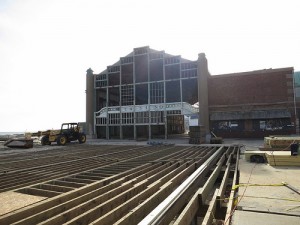 Many along the route look eager to rebuild. Like the construction vehicles pushing sand, they’re counting on being ready for the all-important summer months, when the weather is beautiful, life feels relaxing and the tourist dollars flow. Future hurricanes? Unlikely, their actions seem to say. Several residents assure me that such storms only come around every few decades so its certainly worth rebuilding and getting back to life as usual .
Many along the route look eager to rebuild. Like the construction vehicles pushing sand, they’re counting on being ready for the all-important summer months, when the weather is beautiful, life feels relaxing and the tourist dollars flow. Future hurricanes? Unlikely, their actions seem to say. Several residents assure me that such storms only come around every few decades so its certainly worth rebuilding and getting back to life as usual .
Along the route we come upon my most favorite Jersey Shore town, Asbury Park – a city long plagued by economic depression, corruption, and a past marked by social conflicts. Even when their was no storm the place that brought us Bruce Springsteen and the Jersey Shore sound looked like it was barely getting by. But now even the weathered yet proud old structures that survived that re-development wrecking ball, looked critically wounded. A series of fences and police guided detours lead the public away from the destroyed boardwalk, the centerpiece of the city that is supposed to be on its way back.
It may be a small story in the grand scheme of this world and all its acute problems. Or maybe because it happened in the US, in a state where some people live very comfortably, it does not seem like it could possibly be that bad. But even if people around the world are recognizing the scale of the tragedy that has struck this special place, what remains unclear to me is whether or not people in New Jersey see the big picture of what is to come. Driving through proud shore towns that have their traditions and ways of doing things, it was hard to tell if they will do anything different in an effort to deal with future challenges that may even be worse than this one.
How to See and Hear Egypt
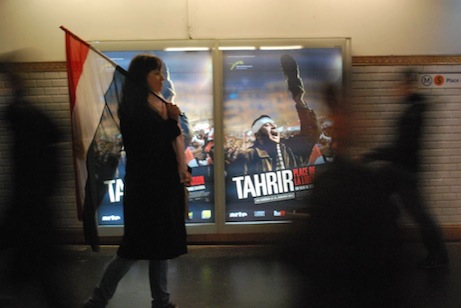 Since the revolution began in 2011, many a foreign journalist has gone to Egypt filled with good intentions and enthusiasm. And while some have done interesting or inspiring work, there are still many in the international media that consistently get half the story or hardly any of it and go home proclaiming that they know what’s what.
Since the revolution began in 2011, many a foreign journalist has gone to Egypt filled with good intentions and enthusiasm. And while some have done interesting or inspiring work, there are still many in the international media that consistently get half the story or hardly any of it and go home proclaiming that they know what’s what.
With our upcoming journey to Tunisia and Egypt, our challenge is to get past those tendencies and see beyond our own natural limitations. To best do that, we turn to our Egyptian friends in-country and from the diaspora, and ask about their experiences and what they most wish journalists would take note of and stay open to while doing their work.
Today on the podcast I speak with a new friend of the program, herself an Egyptian living abroad and living-breathing the revolution everyday even if she isn’t on the streets or in the square; Hanna Yousef is my special guest as part of a conversation to learn her beautiful story and ask what advice she would give to a outsider-journalist like myself, heading to her beloved country for the first time, in search of stories. In many ways this is the preparatory conversation that every journalist should have yet we rarely get to hear as its considered unworthy for your ears; too candid and imperfect. exactly the type of conversation that makes me love podcasting.
